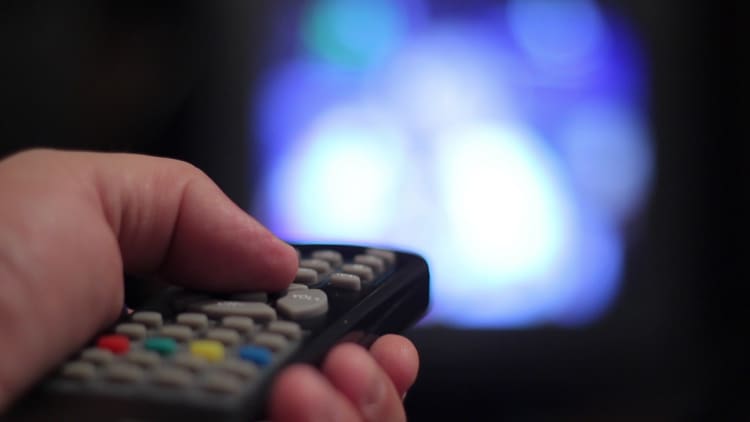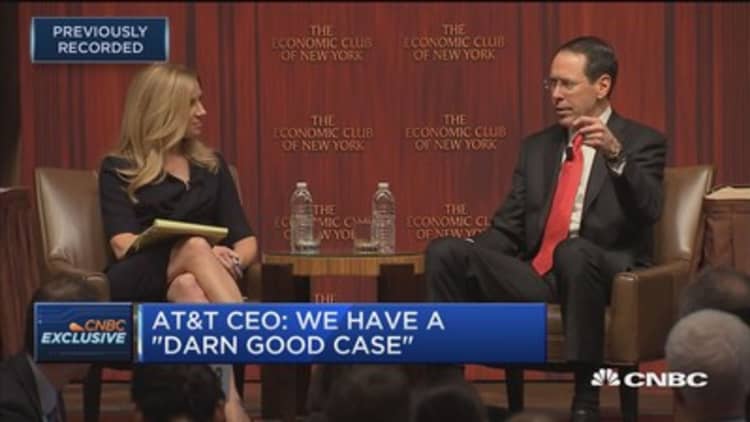
AT&T CEO could be feeling a little like Casey at the Bat as he awaits a verdict on whether his company can buy Time Warner. He's down two strikes, and if he fails this time, his legacy may be sealed.
A blocked Time Warner acquisition would be the third misstep for Stephenson on transformational deals for AT&T. Regardless of the deal's merits, if Judge Richard Leon decides AT&T can't buy Time Warner, Stephenson's attempt to transform the nation's second-largest wireless provider will have proven unsuccessful yet again.
If Time Warner fails, Stephenson would go down in history as the only CEO in modern history who twice had deals of more than $35 billion blocked by government resistance. The one deal he did get through — a $67 billion purchase of DirecTV — has not been a financial success since its 2015 announcement. Combined, the failures would leave Stephenson with a checkered legacy at best.
"It's a reasonable question to ask, 'will this be a failed legacy?' if the deal doesn't go through," said Craig Moffett, an analyst at MoffettNathanson. "At the least, it would be a rather uncertain legacy."
AT&T shares haven't moved much from five years ago, when they were trading around $35. The stock is down about 13 percent in the last 52 weeks.
The AT&T-Time Warner trial is entering its fifth week, and Stephenson is set to testify this week, according to a person familiar with the matter. The Department of Justice's primary argument is AT&T could threaten to withhold Time Warner's programming from other distributors to force higher prices.
AT&T's DirecTV is a pay-TV provider that reaches more than 20 million customers. If Leon believes AT&T will threaten to withhold Time Warner programming from other video distributors, knowing customers could switch to DirecTV as an alternative, he may decide a deal wouldn't be in the best interest of consumers.
AT&T counters that the logic doesn't hold up, as the point of owning content is to get widespread distribution, which brings in affiliate fees and advertising revenue. Time Warner also has contracts with existing TV operators, locking the company into distribution deals for years to come.
Some of the judge's questions during the trial suggest Stephenson may get a reprieve.
Leon asked a government witness from Charter Communications if a "mutually beneficial and mutually fair" arbitration would allow him to feel more at ease with an AT&T-Time Warner deal. Charter is a competitor to AT&T's U-Verse and DirecTV. While in-trial questions don't necessarily hint at Leon's opinion, they may indicate he's weighing ideas about how to allow a transaction to proceed.
Still, reading into a judge's comments and questions is probably more parlor game than reality.
Trying and failing
This is the third time Stephenson has taken a swing at altering AT&T's future with a megadeal. The results haven't been favorable.
Strike one was in 2011 for AT&T's failed attempt to acquire T-Mobile for $39 billion.
Regulators ruled AT&T wasn't allowed to consolidate a wireless market from four players — AT&T, Verizon, Sprint and T-Mobile — to three. AT&T had to pay T-Mobile a $4 billion breakup fee ($3 billion in cash and $1 billion in wireless spectrum) when the companies abandoned their deal. The added cash and spectrum propelled T-Mobile as a stronger independent competitor — one that has stolen customers from AT&T in recent years and pushed prices down.
Strike two was AT&T's 2015 deal for DirecTV. While that acquisition helped AT&T sustain its dividend, the underlying assets have deteriorated as millions of customers left satellite TV. Many are heading for cheaper online options and conventional cable providers, which, unlike AT&T, offer high-speed broadband. The deal, which again cost AT&T about $67 billion, soon "may look more like a $25 billion acquisition soon," Moffett told CNBC last month.
Losing the $85 billion deal for Time Warner would be strike three.
Ironically, if Leon does decide AT&T can't buy Time Warner, it will likely be due to AT&T's prior acquisition of DirecTV — a double-whammy for shareholders. Moreover, Time Warner could support DirecTV by helping AT&T keep together the bundling of channels — the cash cow of the pay-TV industry. Without Time Warner, AT&T will need a strategy refresh, and DirecTV could be further weakened.
Dish: Final option?
Even if the deal fails, Stephenson's job is probably safe, Moffett said. AT&T's board is not known for bold measures and its shareholder base is filled with long-term passive investors. The company, with a market capitalization of more than $230 billion, is probably too big for an activist to mount a successful campaign to oust a CEO, Moffett said.
But Stephenson would face a big dilemma: What to do next?
The best alternative for Stephenson is Dish Network, according to Walt Piecyk, an analyst at BTIG. Dish owns wireless airwaves AT&T could use as it readies itself for a 5G world, and its satellite-TV business could be merged with DirecTV to unlock billions of dollars in cost savings. Plus, AT&T would prevent Dish from going to a competitor.
"Dish offers huge synergies on the pay-TV side and would foreclose wireless spectrum capacity options for its primary competitors, Verizon and T-Mobile," Piecyk said.
Then again, Dish already tried to merge with DirecTV — back in 2002. And the deal was blocked by regulators.
If Time Warner is blocked, perhaps the most fitting conclusion to Stephenson's CEO tenure would be to try one last megadeal, only to see it fail once more.



